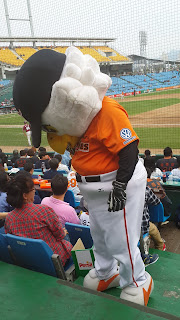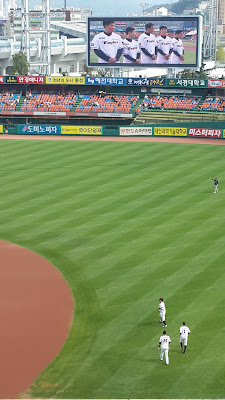Let me give you a little taste of my usual Hanbat Stadium experience, watching the hometown Hanwha Eagles.
Perched up high in the upper decks, scorebook in hand (the only person scoring in the stadium), with a Cass beer and Korean-fried chicken within easy reach, you are afforded a broad view of southwest Daejeon in the lee of Mount Bomunsan. This area of town is mainly known for car detailing shops and motorcycle repair places, and one of the best grilled fish places in town.
I know I may be a little biased, since this is my local baseball stadium, but there really is no better place to view baseball in Korea. Hanbat can only fit 13,000 on a good day, and it's the smallest stadium in the country by far, fitting only half what most places do.
There are specific songs for each batter; in this case, let's imagine it's the venerable "Oppa" Kim Tae-kyun (who first appeared as a 19-year-old Rookie of the Year in 2001 and who has worn the Hanwha jersey for all but two of his professional playing years). A 6'1'' first baseman-DH, he hits the ball like a truck (308 home runs) but he runs like a 37-year-old. The fans are gesturing toward the bleachers, signaling for a home run (again all in perfect harmony), but he strikes out with a mighty swing.
Below, in the visiting section of the stadium along the third base side, you can hear the shout, as the opposing fans (let's say it's the KIA Tigers) roar their approval. They've brought their banners and flags A sea of red jerseys. They're as loud as the Eagles fans, but the lip of the upper deck muffles them a bit. You can hear their chants, but you can't see them.
Another pitching change is coming up in the sixth inning, the third one for the Tigers, and that's normal enough. It seems like a good many of the KBO games feature a turnstile approach to pitching, and there's rarely a complete game to be had in the league.
But what a fine way to spend a warm evening on in the remains of the day.
One thing to understand about the game in South Korea is that it's boisterous. Not only do you have the ubiquitous giant-screen scoreboard barking out the usual batter updates, pitching changes, shell game whirl-arounds, and kiss cams, but there is this constant and enduring back-and-forth chant and song rivalry between opposing sides. It's nigh impossible to fall asleep during a KBO game.
Unfortunately, with the Hanwha Eagles, you also have to turn down the heat on certain things, like the need to always win. The Hanwha Eagles (né Binggrae Eagles in 1985, the first expansion team) have a sort of settled mediocrity about them, and this is an undeniable part of their story. Their lifetime record is .474. They win, they lose, they show up and play before their rapturous fans, but they've only been to the postseason once in the last 12 years (2018), and the last time they went deep in the postseason was 2006, when they lost to the Tigers in the KBO series.
 That was a big year, 2006. Ryu Hyun-Jin, then only 19 years of age, won Rookie of the Year and playoff MVP, and then ran off to everlasting fame with the Los Angeles Dodgers. Now he appears on Korean TV most frequently, usually selling noodles. An even bigger year was 1999, which was the one and only year the Eagles have won the championship in 34 years.
That was a big year, 2006. Ryu Hyun-Jin, then only 19 years of age, won Rookie of the Year and playoff MVP, and then ran off to everlasting fame with the Los Angeles Dodgers. Now he appears on Korean TV most frequently, usually selling noodles. An even bigger year was 1999, which was the one and only year the Eagles have won the championship in 34 years.And yet I can't help but claim the Eagles as my "Korean team" when asked (and I am asked this often). I've only lived in Daejeon in South Korea since 2014, and the stadium is only 2 miles away from my apartment (as the Eagle flies). I've walked back from games in the middle of the night. After failing to see any games in 2014 (the last game of the year was a sell out), I finally got my chance to catch my first-ever KBO game in Hanbat on May 6, 2015. And I've been going ever since. In one fevered stretch, during the Chuseok holiday in September, 2015, I went to 4 games in the last 2 weeks of the season (3 wins, 1 loss!)
You can get stuck on numbers and wins, but I'd rather soak in the aura of the place, its nooks and crannies, intermingle and laugh with the fans and ushers who occupy the upper levels (and even sometimes occasionally sit down below with the cacophony). There are so many fun details to be noticed.
For instance, when I arrived in Daejeon in 2014, there was an article boasting about Hanwha's robot fans, which turned out to be mainly overblown (they mainly squat inert in one area of the outfield), but it was a much bigger deal in 2019 when the Eagles introduced the first foreign cheerleader to Korea, Frenchwoman Doris Roland. She was more charismatic than the robots.
Another local factoid is the team's connection to Chan Ho Park, the first Korean player to pitch over in the United States. Park grew up one town over in Gongju, where there's a gigantic billboard celebrating his achievement outside his high school. After returning to Korea, he played his final season in 2012 for Hanwha.
Daejeon, smack dab in the middle of the country, is a town still working on an identity. (I prefer the tough-but-fair moniker "The Dirty D"). The Hanwha Eagles have followed suit, switching their motto every year. In 2018, the rallying cry was "Break the Frame." In 2019, it was "Bring It! No Matter What." I'm partial to the first one, especially since it clearly paid off with a rare shot at the playoffs that year.
The Eagles have also had an interesting array of foreign hitters, from Jake Fox to the current Jared Hoying, and they like all other players, get a song (foreign players must love the fact that they get sung to). Eagle fans added their own unique pronunciation to Fox's last name, which sounded more like "Fox-u" when it was screamed out as he settled into the batter's box. Hoying has some repetitive quality to his song that ends with the the shout "Hoy Hoy Hoy." The game is worth it just to hear those.
 Speaking of songs, the Eagles also had the BEST song in 2015, when they were celebrating their 30th anniversary in the league, the bombastic Mad Max-looking "Blazing," with Tiger JK, Yoon Mirae, and Bizzy. They unveiled the song before every game that season, and the video contains a beatific montage of Daejeon-esque archetypes - a little boy dressed up and running about in his Hanwha Eagles uniform, an exhausted office worker buried under mounds of paper, an intense researcher-architect staring down a metal statue, an older railroad employee shoveling sand and huffing about with an overloaded wheelbarrow, and just for the coupe de grace, a delinquent college student wailing on a tire with a pipe. That song still fires me up after five years. I don't understand how they didn't win the whole thing just on the power of that alone.
Speaking of songs, the Eagles also had the BEST song in 2015, when they were celebrating their 30th anniversary in the league, the bombastic Mad Max-looking "Blazing," with Tiger JK, Yoon Mirae, and Bizzy. They unveiled the song before every game that season, and the video contains a beatific montage of Daejeon-esque archetypes - a little boy dressed up and running about in his Hanwha Eagles uniform, an exhausted office worker buried under mounds of paper, an intense researcher-architect staring down a metal statue, an older railroad employee shoveling sand and huffing about with an overloaded wheelbarrow, and just for the coupe de grace, a delinquent college student wailing on a tire with a pipe. That song still fires me up after five years. I don't understand how they didn't win the whole thing just on the power of that alone.Truth be told, I have yet to pick up a Hanwha jersey, but I do have my assortment of Eagles tchotchkes, including an orange rally towel I scored near the end of the 2017, a baseball with the Eagles mascot, and the bobble head of second baseman Jeong Keun Woo (now with the LG Twins) that I was handed for showing up to the last game of the season in 2015. I have visited the gift shop frequently in Hanbat Stadium.
So, win, lose, or tie, it's always the right call to cheer for the Hanwha Eagles, who are rich in fan love, and Daejeon angst.
But we must leave the Eagles now, and get on a train heading southeast toward Busan. It's the second inning, and the Lotte Giants are coming up to bat in the cavernous confines of Sajik Stadium.







A debt of gratitude is in order for your glorious posting! I very delighted in understanding it.
ReplyDeleteGlad you enjoyed it!
Delete